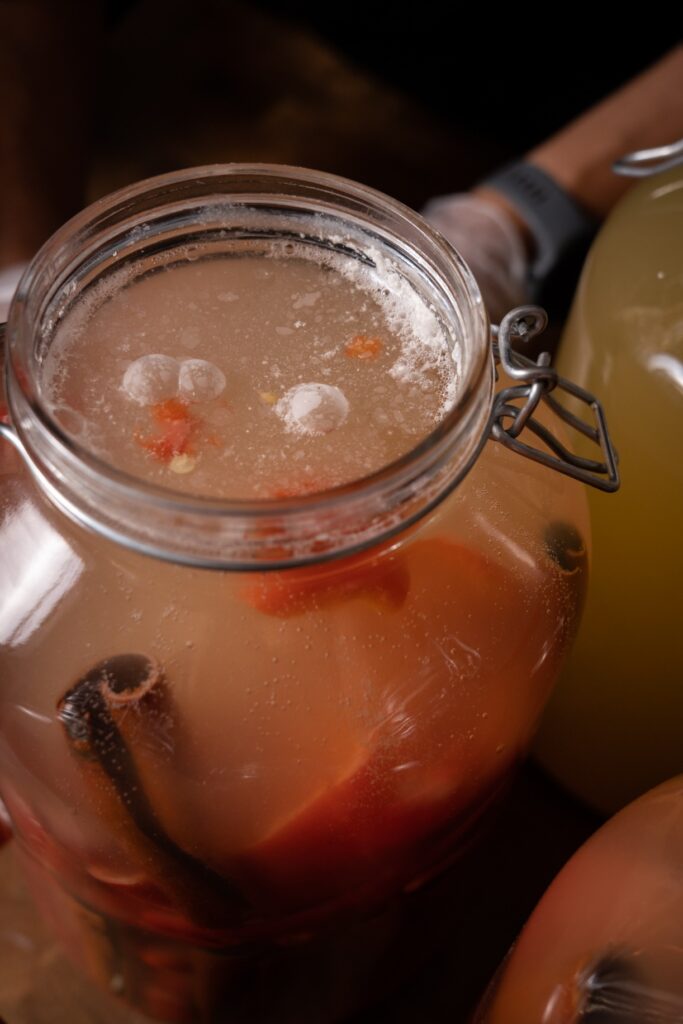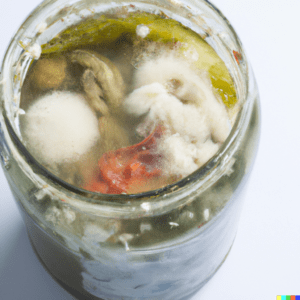The change in color of fermented vegetables can be attributed to various factors and natural processes that occur during fermentation. Here are some common reasons for the color change: Pigment oxidation: When vegetables are exposed to air during fermentation, the pigments present in the vegetables can undergo oxidation. This can lead to changes in color, such as the … [Read more...] about What causes the change in color of fermented vegetables?
Q&A Fermented Foods
WHAT IS KAHM YEAST ? and how to prevent it?
Fermentation is a fascinating process that transforms raw ingredients into flavorful and probiotic-rich foods, much like the bold and fiery creations often enhanced by hot sauce. However, during fermentation, you may encounter a common issue known as Kahm yeast. Understanding what Kahm yeast is and taking preventive measures, Such as using high-quality fermentation starter like … [Read more...] about WHAT IS KAHM YEAST ? and how to prevent it?
Expert Tips to Prevent Mold on Your Fermented Vegetables
If mold develops on the top of your fermented vegetables, it’s important to take appropriate steps to ensure the safety of your ferment. Using the right tools, such as a Fermentation crock 5L, can help maintain the proper environment for fermentation and reduce the risk of mold. Here’s what you can do if you encounter mold during the fermentation process: Assess the … [Read more...] about Expert Tips to Prevent Mold on Your Fermented Vegetables
What causes fermented vegetables to become soft and mushy?
Cause of fermented vegetables to become soft and mushy? There are several factors that can cause fermented vegetables to become soft and mushy. Here are some possible reasons: Over-fermentation: If fermented vegetables are left to ferment for too long, the texture can become overly soft and mushy. The prolonged fermentation process breaks down the cell structure of the … [Read more...] about What causes fermented vegetables to become soft and mushy?
Is the white film on the surface of my vegetables mold?
Determining whether the white film on the surface of your vegetables is mold can be a bit tricky. While mold is a possibility, there are other factors to consider as well. Here are a few things to help you assess the situation: Normal Fermentation: In some cases, a white film or residue can be a natural byproduct of the fermentation process. It can be harmless yeast or … [Read more...] about Is the white film on the surface of my vegetables mold?
What temperature is optimal for fermentation?
The optimal temperature for fermentation depends on the specific type of fermentation you are undertaking. Different ferments require different temperature ranges to ensure successful and desirable outcomes. Let’s explore some common types of fermentation and their corresponding ideal temperature ranges: Vegetable Fermentation: Vegetable fermentation, such as sauerkraut or … [Read more...] about What temperature is optimal for fermentation?
How to determine if fermented vegetables are ready?
Determining the readiness of fermented vegetables is an essential aspect of the fermentation process. Here are a few key indicators to help you determine if your fermented vegetables are ready to be enjoyed: Taste and Texture: The most reliable way to assess the readiness of fermented vegetables is by tasting them. Take a small portion and sample it. Fermented vegetables … [Read more...] about How to determine if fermented vegetables are ready?
How long should I ferment my vegetables for optimal results?
The optimal duration for fermenting vegetables can vary depending on several factors, including the type of vegetables, desired taste, and environmental conditions. However, as a general guideline, most vegetables are fermented for a period of 1 to 4 weeks to achieve the desired flavor and texture. During the fermentation process, beneficial bacteria and yeast gradually … [Read more...] about How long should I ferment my vegetables for optimal results?








1% of each order supports children with juvenile arthritis.